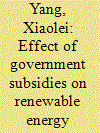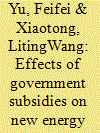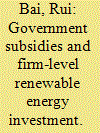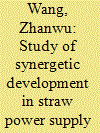|
|
|
Sort Order |
|
|
|
Items / Page
|
|
|
|
|
|
|
| Srl | Item |
| 1 |
ID:
167014


|
|
|
|
|
| Summary/Abstract |
By considering 92 renewable energy listed enterprises in China between 2007 and 2016 as sample, this paper constructs a panel threshold effect model to investigate the threshold effect of government subsidies on renewable energy investment and further explores the effects and differences regarding government subsidy types and enterprise size on the threshold effect. The results show that, first, government subsidies have a positive threshold effect on renewable energy investment of China. When energy consumption intensity and bank credit are greater and the level of economic development is less than the threshold value, the contribution of government subsidies to renewable energy investment is significantly enhanced. Second, monetary subsidies and tax incentive policies can promote renewable energy investment, but the effect of tax incentives is more significant. Third, government subsidies are the main force supporting the development of medium-, small-, and micro-sized renewable energy enterprises. On the basis of these results, the Chinese government should strengthen policy support in those areas with high economic costs of energy transition, encourage the investment in renewable energy in large-sized enterprises, play a policy-guiding role, and focus on strengthening subsidies for medium-, small-, and micro-sized enterprises.
|
|
|
|
|
|
|
|
|
|
|
|
|
|
|
|
| 2 |
ID:
175037


|
|
|
|
|
| Summary/Abstract |
In this study, subsidies are classified into government subsidies beforehand (GSB) and government subsidies afterwards (GSA). We examine the impacts of GSB and GSA on the financial performance of Chinese enterprises of New Energy Vehicle (NEV). Analyzing a dataset of Chinese NEV firms' financial performance from 2013 to 2017 with panel regression models, we demonstrate that the two forms of government subsidies have different impacts on New Energy Vehicle enterprises' performance. Specifically, we find a positive U-shaped relationship between GSB and financial performance and an inverted one between GSA and financial performance. We further investigate the moderating role of intelligent transformation in the relationships between government subsidies and NEV enterprises’ performance. Our empirical analysis suggests that intelligent transformation can improve the efficiency of GSA and weaken the negative effects of excessive GSA. These results highlight the importance of intelligent transformation for NEV enterprises, providing policy makers with new insights into NEV subsidy policies.
|
|
|
|
|
|
|
|
|
|
|
|
|
|
|
|
| 3 |
ID:
192518


|
|
|
|
|
| Summary/Abstract |
The author examines the role of Dobrovolny Flot (lit. "Volunteer Fleet," hereinafter Dobroflot or the Fleet) in the expansion of shipping traffic between the European and Far Eastern regions of Russia between 1891 and 1914. This paper presents the first ever comprehensive assessment of the effectiveness of this state-controlled shipping enterprise and contributes to the evaluation of commercial performance indicators of maritime freight and passenger transportation in the Russian Empire. An empirical analysis reveals a firm relationship between government support and the stability of coastal shipping operations. Additionally, the author finds that growth of the state-owned company's profitability came mainly from an increase in profits from the transportation of commercial cargoes. Using archival documents, corporate statistics, and records of State Duma debates, the author demonstrates that attempts to increase the volume and activity of interregional transportation led to major changes in the principles of government regulation, that the reform was inspired by the desire to support cargo transportation rather than passenger traffic, that the reform was characterized by cooperation between officials and business circles, and that legislative acts (of 1892, 1902, 1912, and 1914), although flawed in some respects, nevertheless provided a basis for future public-private partnership. This conforms to conclusions that the development of the transportation business was largely caused by growing income resulting from transformations in Russia's infrastructure sector, by the government's regional innovations, and by private interests related to cross-border commercial interaction. The author's findings support arguments that government support could accelerate transformations in the shipping business and contribute to the commercial orientation of the state-owned company's activities.
|
|
|
|
|
|
|
|
|
|
|
|
|
|
|
|
| 4 |
ID:
181803


|
|
|
|
|
| Summary/Abstract |
Understanding the heterogeneity and influencing factors of renewable energy investment between enterprises can help to evaluate existing policies and provide guidance for future subsidy policies. This paper investigates how the relationship between government subsidies and renewable energy investment depends on enterprise size and relaxes the linear relationship in the traditional empirical model. Based on firm-level panel data from China, only when the enterprise size exceeds a certain threshold value can it have a significant effect. The effect of government subsidies on renewable energy investment is on the rise. However, its speed tends to decrease with the growth of enterprise size. Besides, ownership concentration and enterprise growth significantly promote investment in renewable energy. The empirical results show that the effect of government subsidies has a significant enhancement in 2016, which may be due to high frequency and high government subsidies in the early stage. These findings are robustly verified. Finally, some specific policy suggestions are put forward.
|
|
|
|
|
|
|
|
|
|
|
|
|
|
|
|
| 5 |
ID:
175247


|
|
|
|
|
| Summary/Abstract |
Power generation from straw not only helps to meet the energy demands but also provides an effective way to dispose of straw. However, in order to boost straw power generation industry, many factors such as willingness of farmers, high collection cost and uncoordinated supply chain are the major issues need to be solved. In the present work, synergetic development of the straw power supply chain has been studied by establishing collaborative evolution model and the marginal utility of government subsidy has been defined. Our results showed that in farmer subsystem, the selling price of straw is the order parameter of the straw supply chain and has the positive feedback in straw supply chain system which can lead the development of the system. Increase in selling price can promote the synergistic development of the straw supply chain. The results indicate that the subsidies affect the synergetic development of the straw supply chain, and increase in government subsidies will promote the development of straw power generation system. The findings suggested that a government subsidy of 53 CNY/t would optimize utility, given the existing synergetic system. The results can be helpful for government policy makers to support straw power generation projects.
|
|
|
|
|
|
|
|
|
|
|
|
|
|
|
|
|
|
|
|
|